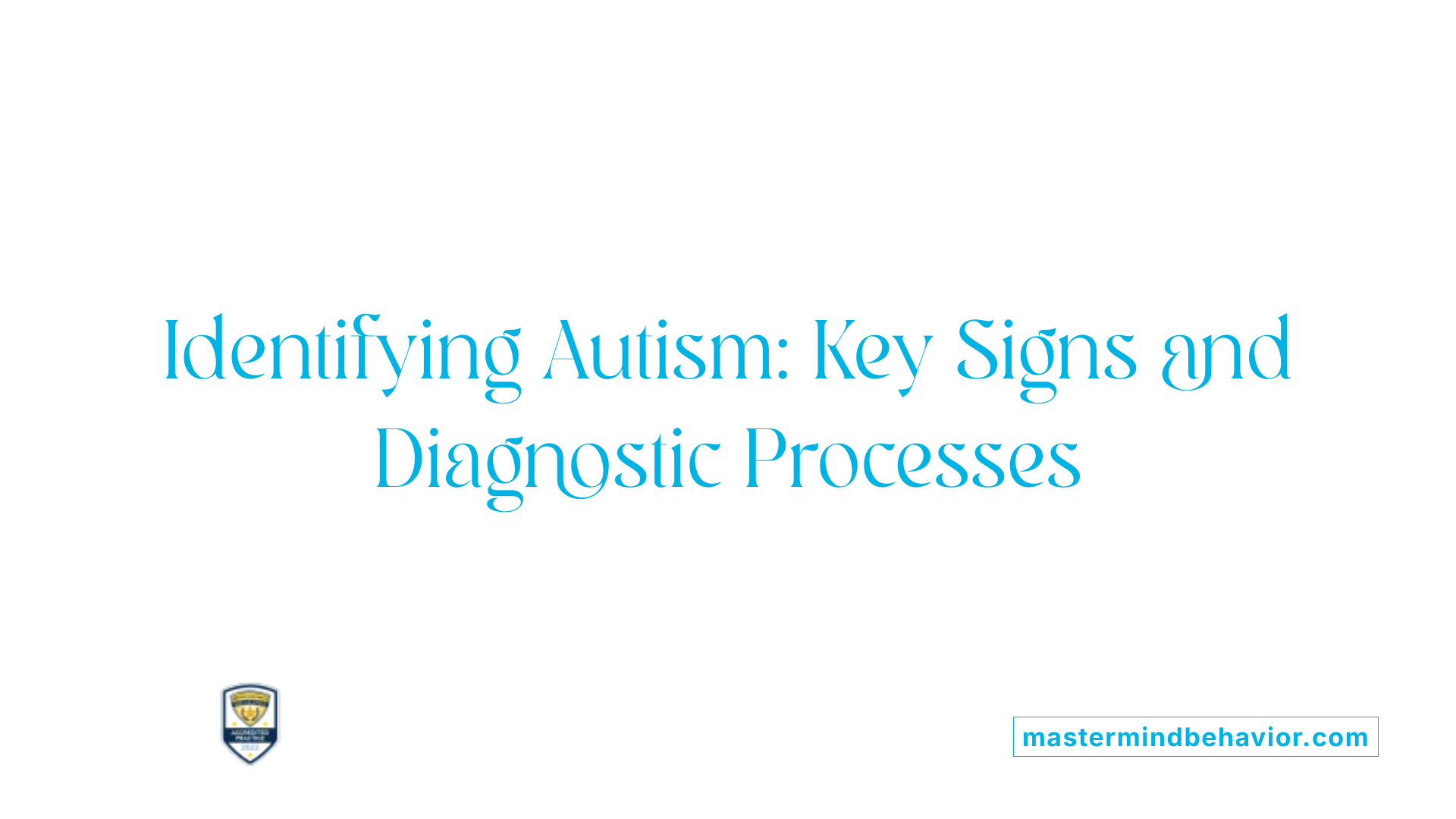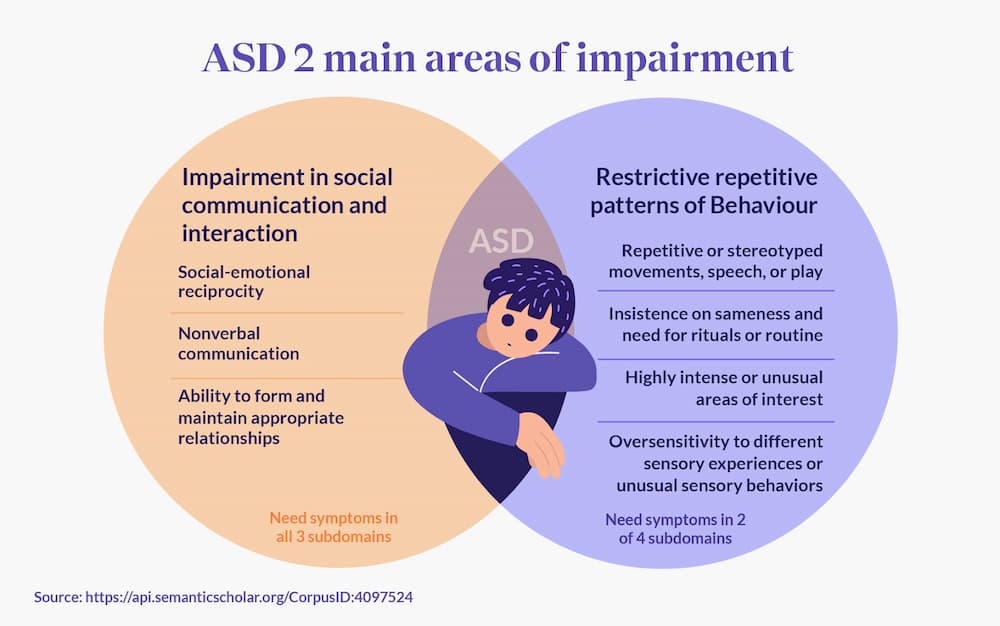Key Symptoms And Signs to Recognize in People With Behavioral Autism
When you encounter someone with behavior autism, identifying vital symptoms and signs is crucial. You could observe difficulties in social interactions and communication, as well as a strong demand for regimens. In addition, sensory level of sensitivities can bring about frustrating experiences. Comprehending these qualities can improve your support and interventions, yet there's even more to uncover about just how these habits materialize in everyday scenarios. Allow's explore what these signs actually appear like.
Obstacles in Social Interactions
When you communicate with a person on the autism spectrum, you might observe they struggle with social hints and interaction. These difficulties can make social communications feel overwhelming for them.
In addition, you may discover that they prefer routines and acquainted settings, which can restrict their willingness to participate in new social scenarios. They might chat regarding their interests in fantastic information without discovering if you're interested when they do engage. This can cause discriminatory conversations that leave you really feeling detached. Understanding these obstacles can aid you approach interactions with empathy and persistence, cultivating a more comfortable atmosphere for both of you.
Problem With Verbal and Non-Verbal Communication

Identifying these signs is essential, as it assists you far better support and engage with people on the autism range. By understanding their interaction challenges, you can promote much more purposeful links and offer a more encouraging environment.
Repeated Actions and Routines
Interaction challenges commonly come with other signs of autism, such as repeated actions and a strong preference for routines. You may see that people with autism often participate in particular, repetitive activities, like hand-flapping, shaking, or duplicating phrases. These habits can offer comfort and a sense of control in an often frustrating globe.
Routines are equally important; many people grow when they follow an organized routine. You might find that changes to these routines can result in considerable distress. As an example, if they have an everyday ritual of eating morning meal at a details time or adhering to a particular route to school, any disruption can cause stress and anxiety.
Recognizing these patterns helps you understand their actions and give assistance. By accommodating their need for routine and enabling recurring actions, you can create a more comfortable setting that alleviates their difficulties.
Sensory Sensitivities

Common Sensory Triggers
Sensory level of sensitivities can considerably affect day-to-day life for individuals with autism, as specific stimulations typically cause overwhelming reactions. Usual sensory triggers include loud sounds, intense lights, and strong smells. You could notice that unexpected audios, like alarm systems or sirens, create anxiousness or distress. In a similar way, fluorescent lighting in stores can feel uncomfortable and harsh. Textures can additionally play a considerable role; harsh textiles or certain food textures may be intolerable for you. Additionally, crowded locations can bewilder your senses, making it difficult to concentrate or unwind. Comprehending these triggers can aid you manage your environment much better. By understanding what impacts you, you can take actions to decrease discomfort and enhance your everyday experiences.
Behavior Feedbacks Clarified
Comprehending your behavior responses to sensory level read this article of sensitivities is important, as they usually reveal just how you interact with the globe. You may likewise find yourself seeking specific sensory experiences, like deep stress or silent atmospheres, to help ground on your own. Recognizing these patterns aids you understand your demands much better and can guide exactly how you interact them to others.
Coping Approaches Review
Acknowledging your sensory level of sensitivities is just the very first action; currently it's time to discover coping approaches that can assist you manage those experiences successfully. Begin by creating a sensory toolkit customized to your requirements. Establishing a structured regimen can additionally supply predictability, decreasing stress and anxiety around sensory overload.
Restricted Interests and Focus
While several people establish a vast range of rate of interests, those with autism frequently show limited interests and an extreme focus on specific topics. You could notice that someone with autism can spend hours delving right into their favored topic, whether it's a certain sort of train, a particular film, or a clinical idea. This intense focus isn't simply a pastime; it can end up being a central component of their identity and social interactions.
You might discover that discussions rotate around these passions, and they may have a hard time to engage in more comprehensive topics. For them, these concentrated interests supply comfort and a feeling of mastery. While it is necessary to encourage exploration of brand-new subjects, appreciating their interests is equally essential. By comprehending and acknowledging these restricted passions, you can foster a helpful setting where they feel valued and comprehended, permitting more significant links and interactions.
Emotional Law Problems
Individuals with autism commonly encounter challenges in emotional regulation, which can be influenced by their extreme concentrate on details interests. You may notice that when an individual is deeply participated in a recommended activity, they can experience strong emotions, whether enjoyment or aggravation. When points do not go as planned., this intensity often makes it tough for them to change equipments or manage their feelings - Autism Behavioral Therapy.

Irregularity in Developmental Milestones
When it comes to developmental milestones, you'll observe that individuals with autism typically reveal a large array of irregularity. You might see a child succeed in language skills however struggle with social communications.
It's necessary to recognize that each that site individual's trip is one-of-a-kind. Some might establish complex skills early, just to deal with challenges in the future. Others may take he said longer to achieve basic milestones yet after that prosper in certain areas. Observing these patterns can help you recognize their toughness and requires better.
Often Asked Inquiries
Just How Is Autism Identified in Kid and Grownups?
To diagnose autism in children and grownups, experts evaluate actions, communication skills, and social communications. They usually utilize standardized examinations, interviews, and monitorings to figure out if an individual fulfills the criteria for autism range condition.
Are There Various Kinds of Autism Range Disorders?
Yes, there are different sorts of autism spectrum problems, including Asperger's disorder and prevalent developing disorder-not otherwise specified. Each kind varies in seriousness and features, so understanding these distinctions can assist you much better support individuals with autism.
What Therapies Work for Individuals With Autism?
When thinking about efficient therapies for individuals with autism, you'll find options like Applied Habits Evaluation, speech treatment, and occupational treatment. Each approach can help enhance communication, social abilities, and day-to-day functioning tailored to individual needs.
Can Individuals With Autism Lead Independent Lives?
Yes, individuals with autism can lead independent lives. With the appropriate support, skills training, and sources, you can aid them develop self-sufficiency, handle everyday tasks, and prosper in numerous environments, promoting their self-reliance.
Just How Can Family Members Support Loved Ones With Autism?
You can support your liked ones with autism by producing a structured atmosphere, motivating their passions, exercising perseverance, cultivating interaction, and advertising social abilities. Commemorate their success, no issue just how tiny, and construct a helpful area.
Although several people on the autism range can understand and use language, they usually encounter substantial difficulties with both non-verbal and verbal interaction. Acknowledging these indications is crucial, as it helps you much better assistance and involve with people on the autism range. You may discover that people with autism usually involve in particular, repeated activities, like hand-flapping, shaking, or duplicating expressions.Sensory level of sensitivities can substantially affect daily life for people with autism, as particular stimuli frequently set off frustrating reactions.When it comes to developmental turning points, you'll observe that people with autism frequently show a large array of irregularity.